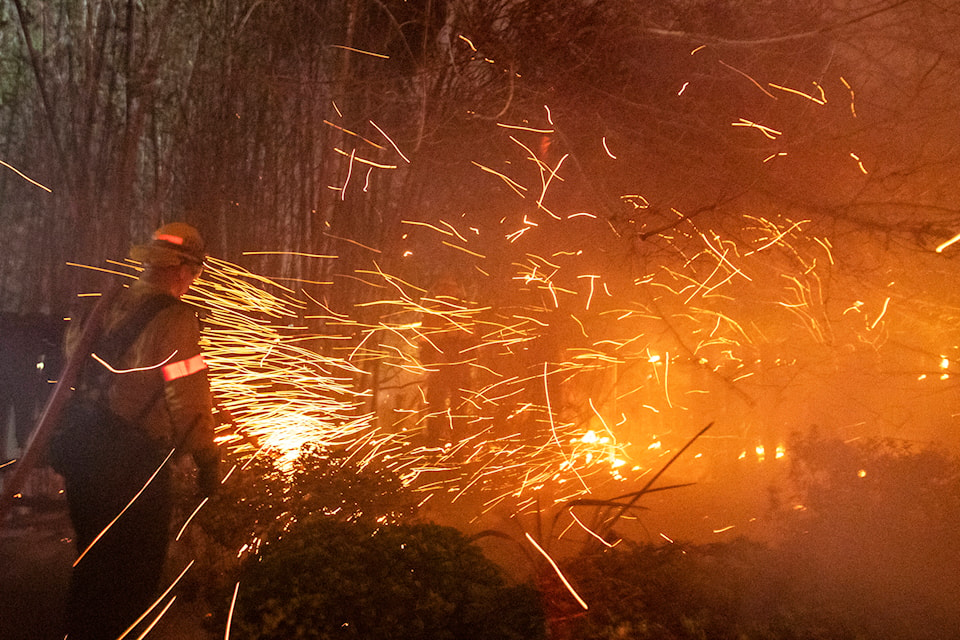Tony Grewal frantically called his neighbours every day in panic after having travelled from Simi Valley, northeast of downtown Los Angeles, to Canada to visit his wife and son in Ottawa where he learned about the wildfires during his stay.
“I told them to call me if anything came up, but hopefully I said please don’t, which means it’s a good sign and they didn’t. But I checked with them every day, twice a day,” the Los Angeles resident told Humber Et Cetera.
“Unfortunately, a good friend of ours lost his home. I was pretty shocked when I heard he lost his house and I’m sure he thinks it’s all very surreal, it doesn’t feel real, wakes up in the morning thinking is this a dream,” he said.
“He had a very nice home but it was surrounded by a lot of trees. It was beautiful because there was a lot of grass around, a lot of trees which unfortunately caused the fire I’m sure,” Grewal said.
He said his friend’s house is located in Altadena and was built many years ago, made out of lots of wood while newer homes have fibre-reinforced material yet many of these homes are quite old and never had these conditions.
“I’ve lived in California for 30 years. For the first 20 years of living there, from 1989 to 2009, we never had this kind of weather. It just never existed. This is because of a change in global weather patterns and it’s now going to become a regular occurrence,” Grewal said.
Survivor of the Fort McMurray fires in 2016 and author of What You Take With You:Wildfire, Family and the Road Home, Therese Greenwood, said she understands the desperation of those in L.A. who had been denied fire insurance coverage and are afraid of losing everything.
She recommends giving them some time and space to process this life-changing event.
“If you have been in a wildfire, you know escape is the only option. You can’t fight it as an individual. You need to save yourself and your family because no one is coming to help you anytime soon,” Greenwood said.
“The firefighters have to focus on key infrastructure like bridges and highways, keeping escape routes open and also on water treatment plants and things that help them fight the fire," she said. "They may also be evacuating hospitals and senior care facilities. If you have the ability and means to evacuate, the best thing you can do is get away safely.”
“The L.A. fires are not an isolated event," Greenwood said. "There have been several large fire events since the Fort McMurray wildfire. In 2017 the interior of British Columbia went through terrible wildfires, then just last year two fires converged during a really hot and dry spell in the Rockies to rip through Jasper National Park, destroying over 30 per cent of the townsite."
She said wildfire risks are already a present risk for many parts of Ontario and as the world continues to get hotter the risk will only increase.
“My experience as a survivor of a wildfire and witnessing communities continuing to burn over the last decade is what fuels my passion to be a volunteer board chair for The Resilience Institute, a Canadian charity that is focused on minimizing suffering caused by climate impacts, like wildfires,” she said.
Anabela Bonada, managing director of climate science at the University of Waterloo, said rising average temperatures contribute to more frequent droughts, which increase fuel for wildfires and hot, windy conditions, helping them spread.
“L.A. experienced prolonged drought this year and combined with extreme Santa Ana winds, it created ideal conditions for these intense wildfires,” Bonada said.
She said from an Ontario perspective, wildfires are a natural part of Ontario’s northern landscape and due to climate change, an increase in both the frequency and severity of wildfires is expected.
The Canadian Council of Forest Ministers reported in 2019 that fires are burning hotter and wilder as the climate warms, causing much greater destruction.

“While southern Ontario has historically seen fewer wildfires, growing populations in forested areas and a warming climate heighten the risk. If we experience a particularly dry winter and spring, followed by a hotter-than-average summer, the likelihood of wildfires significantly increases,” Bonada said.
She said to address climate change, mitigation and adaptation are essential. Mitigation involves reducing greenhouse gas emissions such as opting for public transit or cycling instead of driving and reducing energy use while adaptation could involve preparing homes for wildfires, flooding and extreme heat.
City of Mississauga's environment manager Dianne Zimmerman agrees.
“Wildfires already exist in certain parts of Ontario (outside of southern Ontario). While wildfires are naturally occurring and part of a healthy ecosystem, climate-related conditions have changed both the intensity and frequency of these fires which result in more severe conditions,” she said.
Mississauga Fire's Deputy Fire Chief Stephane Malo said local firefighters have not experienced wildfires in Mississauga although there are grass fires from time to time.
“While it is remotely possible to have wildland fires in some of our parks, for example, we have the resources to mitigate large scale events. In cases where we would need additional resources, we know we can count on our neighbouring municipalities to assist with staff and equipment on short notice if/when needed. Likewise, we can also assist our neighbours with resources if they need it from us,” Malo said.
Ben Gallagher, manager for the office of emergency management in Mississauga, said his office monitors the provincial wildland fire situation each fire season through their updates.
“This assistance ensures sufficient emergency management personnel are available to support challenging provincial wildland fire responses, and provides city staff with learning opportunities, equipping them with additional knowledge which can help when responding to emergencies locally,” Gallagher said.




